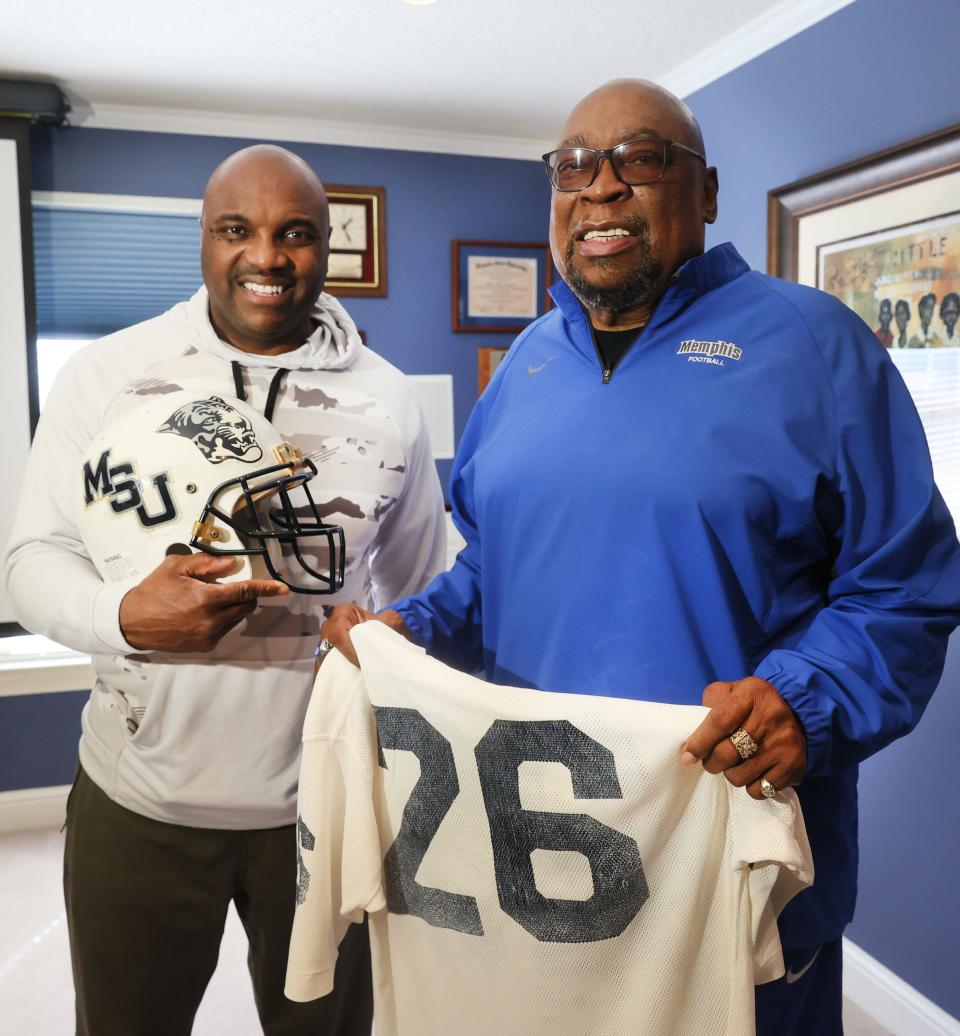Memphis football to honor Glenn Rogers Sr., program's first Black player
Fifty years ago last summer, Glenn Rogers Sr. graduated from Memphis with mixed feelings. He walked on to the football team as the program's first Black player in spring 1968 but felt he was denied more playing time because of his race.
The bitterness faded in time and Rogers went on to a successful career as a coach and educator. Next month, his place in Tigers history will be properly recognized as the school announced Tuesday that Rogers will be honored on Nov. 10 when Memphis hosts Tulsa.
Memphis will not only name Rogers an honorary captain, he'll be presented to fans during a halftime ceremony. His name and number 26 will be painted on the field at Simmons Bank Liberty Stadium.
"I think through God’s grace, I’ve been blessed to get this honor from this administrative staff as far as the president and coaching staff," Rogers Sr. told The Commercial Appeal. "It’s a sense of pride that it’s going to occur. I know that it took a long time coming and the athletic director was real receptive to honoring me. I really appreciate that."

Rogers, who played from 1969-71, initially joined the team as a tight end but was moved to defensive back. In 1969, Rogers and Stan Davis became the first Black players to play in a Memphis football game when they suited up against Ole Miss.
Rogers said he faced some initial pushback from White teammates who weren't used to playing with a Black teammate but during most of his time, he rarely heard racial slurs from coaches or teammates. He did recall hearing racist chants against Ole Miss in his debut directed towards him and Davis.
He saw teammates promoted from second-string to first-string over him and was only told by then-coach Billy J. Murphy that the best players would play. Rogers felt then, and believes, now that he was passed over because he was Black.
𝗚𝗹𝗲𝗻𝗻 𝗥𝗼𝗴𝗲𝗿𝘀 𝗦𝗿.: Paving The Path
On Thursday, November 10th, we honor the legacy of Glenn Rogers Sr. as the first African American to play football at the University of Memphis.#ALLIN | #GoTigersGo
📎 https://t.co/HcP3z1mChn pic.twitter.com/yhuduhD9IM— Memphis Football (@MemphisFB) October 18, 2022
GIANNOTTO:No lead is safe for Memphis football and Ryan Silverfield's job won't be if this keeps up
HEARTBREAK:Memphis football loses to East Carolina in four overtimes after blowing 17-point lead
Yet Rogers' three-year stint paved the way for Black players to join the Tigers such as Charles Greenhill, Isaac Bruce, DeAngelo Williams, Anthony Miller and many more. There's also a plaque in the Memphis football complex that commemorates Rogers along with his son Glenn Jr., who played for the Tigers from 1989-91.
"Glenn Rogers Sr. was a trailblazer for not only our football team, but the University of Memphis, and I couldn’t be prouder to honor him at our game against Tulsa,” Memphis athletic director Laird Veatch said in a release. “His courage and determination helped pave the way for so many and his contributions to the community have been incredibly impactful.”
Rogers earned the M Club Hall of Fame Billy J. Murphy Award in 2000 for his post-football contributions to the Memphis community. He didn't attend many Memphis football games after he graduated because there was still some pain over his experiences.
Now, Rogers just has gratitude and love for being recognized for paving the way for future Tigers to play the sport he loved.
"I’m glad that I have an opportunity while I have a sound mind and able to express myself to see it happen and feel it," Rogers said. "I don’t know how I’ll feel that night but I’ll probably have tears of joy and happiness because I really appreciate the honor."
This article originally appeared on Memphis Commercial Appeal: Memphis football to honor Glenn Rogers Sr., first Black player, on Nov. 10

